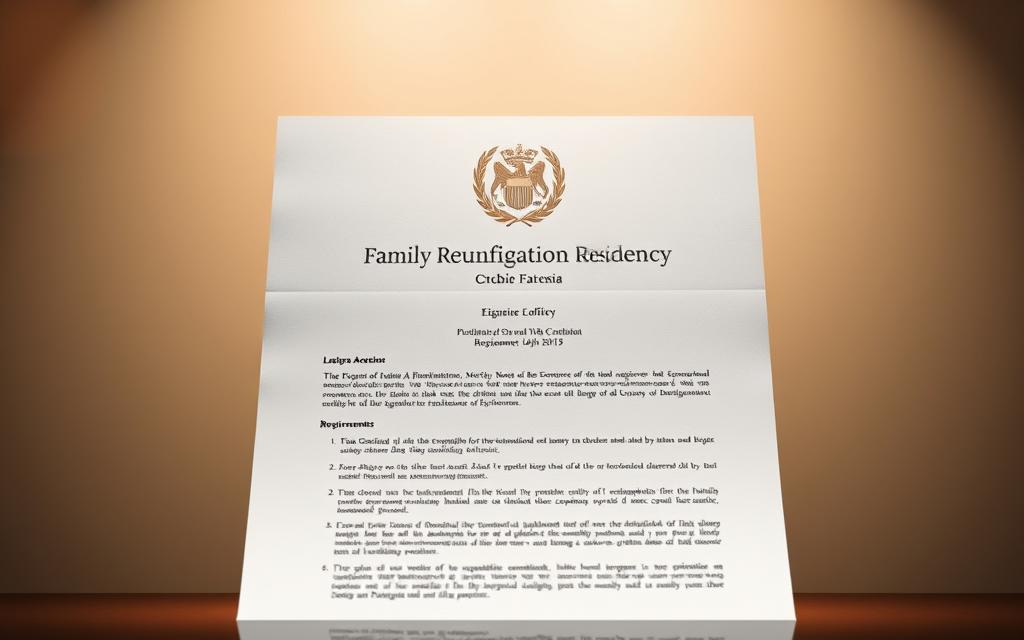Family Reunification Residency in Costa Rica Explained

Costa Rica has become a haven for individuals and families seeking a better quality of life and new opportunities. Known for its lush landscapes, pleasant climate, and rich cultural heritage, this Central American country is an attractive destination for those looking to settle.
For many, the concept of home extends beyond borders, embracing family at its core. Costa Rica's Family Reunification Residency program facilitates the merging of households across nations, providing a comforting solution for citizens or residents looking to unite with loved ones.
The country's immigration system values family unity, making residency accessible to spouses, children, and parents. Understanding the process, from eligibility requirements to document preparation and application submission, is crucial for a successful application.
Understanding Family Reunification Residency in Costa Rica

Costa Rica's commitment to family unity is reflected in its Family Reunification Residency program, which simplifies the residency process for family members. This program is particularly appealing to those who wish to relocate with their loved ones to a country known for its stability and high quality of life.
What is Family Reunification Residency?
Family Reunification Residency in Costa Rica is a residency category that allows family members of a resident or citizen to join their relatives in the country. This program is designed to keep families together, providing a straightforward path to residency for spouses, children, and other dependents. To qualify, applicants must demonstrate their family relationship with the resident or citizen sponsor in Costa Rica. We can explore more about residency and its relation to dual citizenship for a deeper understanding of the benefits.
Why Costa Rica is an Attractive Destination for Families
Costa Rica stands out as an attractive destination for families due to its stable democracy, peaceful environment, and excellent healthcare system. The country boasts a well-developed education system, with both public and international schools available. Additionally, Costa Rica's natural beauty, including its beaches, rainforests, and mountains, offers families an exceptional quality of life. The country's commitment to environmental sustainability also aligns with the values of many families. With a comfortable climate year-round, Costa Rica is an ideal location for family living.
Eligibility Requirements for Family Reunification Residency

Eligibility for family reunification residency in Costa Rica depends on meeting certain family ties and documentation requirements. To sponsor a family member, applicants must prove their relationship through official documents.
Who Qualifies as Family Members?
Immediate family members are eligible for sponsorship under Costa Rica's family reunification program. This includes spouses, parents, and children of Costa Rican citizens or residents. We must establish the familial relationship through proper documentation.
Spouses are considered immediate family members, and their marriage must be legally recognized. Children, including adopted children, and parents of Costa Rican citizens or residents also qualify.
Relationship Documentation Requirements
Proving family relationships for residency applications requires official documentation that has been properly authenticated. Spouses must provide an official marriage certificate, while children and parents must provide birth certificates that clearly indicate the familial relationship.
All documents issued outside of Costa Rica must be legalized either through the Apostille process or through the Costa Rican consulate in the country of origin. Non-Spanish documents must be officially translated by a certified translator in Costa Rica.
To be eligible for sponsorship, the required documents must be properly authenticated and translated if necessary. This ensures that the familial relationship is verified, and the application process can proceed smoothly.
Required Documents for Family Reunification Residency
When applying for family reunification residency in Costa Rica, it's crucial to understand the necessary documents required for a successful application. The process involves gathering various personal and relationship documents, which must be authenticated and, if necessary, translated.
Essential Personal Documents
The primary documents required for family reunification residency include a valid passport, birth certificate, and proof of relationship to the Costa Rican resident or citizen. For instance, the birth certificate of the foreign applicant must be issued by their country of origin, stating their parents' names, place, and date of birth. For more information on the residency process, you can visit https://www.jaroscr.com/how-to-get-residency-in-costa-rica/.
Additionally, spouses may need to provide a marriage certificate, which should also be duly authenticated. These documents form the foundation of the application and are critical for a successful submission.
Document Authentication and Translation
All foreign documents submitted for family reunification residency in Costa Rica must undergo a specific authentication process. Documents issued outside Costa Rica need to be legalized through either the Apostille process (for countries part of the Hague Convention) or consular legalization at the nearest Costa Rican consulate in the country of origin.
- Documents issued outside Costa Rica must be legalized through either the Apostille process or consular legalization.
- The Apostille simplifies the certification process for international use, eliminating the need for additional legalization by the Costa Rican Foreign Affairs Ministry.
- For countries not part of the Hague Convention, documents must be authenticated in the country of origin, then legalized by the Costa Rican consulate, and finally by the Costa Rican Ministry of Foreign Affairs.
- All documents in languages other than Spanish must be officially translated by a certified translator in Costa Rica.
The authentication and translation processes can be time-consuming and costly, so it's advisable to start gathering and processing documents well in advance of the application submission.
The Application Process for Family Reunification Residency in Costa Rica

Navigating the application process for family reunification residency in Costa Rica can be complex, but understanding the steps involved can simplify the journey. We will guide you through the necessary procedures to ensure a smooth application process.
Step-by-Step Application Guide
The application process for family reunification residency involves several key steps. First, it's crucial to prepare all required documents, including personal identification, proof of family relationship, and financial statements. We recommend having these documents legalized and translated before traveling to Costa Rica to avoid delays.
Once in Costa Rica, you should submit your residency application as soon as possible. It's essential to ensure that your application is complete and properly organized to prevent unnecessary setbacks. For more information on what happens if your residency is denied, you can visit this page.
Common Challenges and How to Overcome Them
Several challenges can arise during the family reunification residency application process. Some of the most common issues include document authentication, language barriers, and processing delays. To overcome these challenges, it's advisable to start the document authentication process early and work with the appropriate consulates or use the Apostille process where applicable.
- Document authentication can be overcome by starting the process early and working with the appropriate consulates or using the Apostille process.
- Language barriers can be addressed by working with a bilingual immigration attorney or professional translator.
- Processing delays can be minimized by applying well in advance and ensuring all documentation is complete and properly organized.
- Changes in immigration policies can be navigated by working with professionals who stay updated on the latest regulations.
- Proving authentic family relationships may require additional documentation or legal procedures, especially in cases of common-law partnerships or adoptions.
- Maintaining legal status during the application process is crucial, and understanding the proper timing and visa extensions is important.
- Financial requirements can be met by careful planning and documentation of financial resources to meet Costa Rica's standards for family support.
Legal Considerations and Immigration Law
Understanding the legal landscape of immigration in Costa Rica is essential for families seeking reunification. Costa Rica's immigration laws are designed to facilitate family unity while ensuring compliance with national regulations.
Understanding Costa Rican Immigration Laws
Costa Rican immigration laws govern the process of family reunification, outlining the eligibility criteria, required documentation, and application procedures. For expert guidance on navigating these laws, consulting with a professional service like Jaros CR can be beneficial.
The laws are structured to balance the country's demographic and economic needs with humanitarian considerations for family unity. As such, they provide a framework for eligible family members to join their relatives residing in Costa Rica.
Rights and Responsibilities of Family Reunification Residents
Family reunification residents in Costa Rica are entitled to various rights, including access to public healthcare, education, and the right to work legally in the country. They are required to affiliate with and contribute to the Costa Rican Social Security system (CCSS), which provides comprehensive healthcare coverage.
Residents must also carry their residency identification card (DIMEX) at all times and renew their residency status as required. They have the responsibility to report any changes in their family status or address to the immigration authorities within the specified timeframe.
Benefits of Family Reunification Residency

Family reunification residency in Costa Rica offers numerous benefits that make it an attractive option for families looking to settle together. By choosing this path, families can enjoy a more stable and secure future in a country known for its welcoming environment and high quality of life.
Access to Healthcare and Education
One of the significant advantages of family reunification residency is the access it provides to Costa Rica's healthcare and education systems. Residents can benefit from the country's high-standard medical facilities and educational institutions, ensuring that all family members receive the care and education they need.
Path to Permanent Residency and Citizenship
Family reunification residency is not just a temporary solution; it's a stepping stone to more permanent status. After holding a temporary residence permit for at least three years, families can apply for permanent residency, which offers greater stability and fewer renewal requirements. Furthermore, after seven years of legal residence in Costa Rica, residents can apply for citizenship, granting them the right to a Costa Rican passport and all the benefits that come with it, including visa-free travel to over 150 countries.
We can enjoy additional benefits as permanent residents, including the unrestricted right to work without needing separate work permits and the ability to remain outside Costa Rica for longer periods without jeopardizing our status. The path to citizenship requires demonstrating proficiency in Spanish, knowledge of Costa Rican history and civics, and good moral character. Costa Rica allows dual citizenship, making it possible to maintain our original nationality while enjoying the benefits of being a Costa Rican citizen.
Comparing Family Reunification with Other Residency Options

When considering residency in Costa Rica, several options are available, each with its unique benefits and requirements. Family Reunification is one such pathway, but how does it compare to other residency categories?
Retirement (Pensionado) vs. Family Reunification
The Pensionado category is designed for retirees who can demonstrate a minimum monthly income from a pension. Unlike Family Reunification, which focuses on family ties, Pensionado applicants must meet specific income requirements. For instance, Pensionados need to show a monthly income of at least $1,000 from a pension. In contrast, Family Reunification residency is based on relationships with Costa Rican citizens or residents, making it more accessible for families.
Investment (Inversionista) vs. Family Reunification
The Inversionista category is geared towards individuals who invest in Costa Rica, either through real estate, businesses, or other investments. While this option requires significant financial investment, it offers a different pathway to residency compared to Family Reunification. For those who qualify, Inversionista can be an attractive option, but it involves different criteria and benefits than Family Reunification.
Rentista vs. Family Reunification
The Rentista program is designed for individuals with a stable, unearned income. To qualify, applicants must demonstrate a monthly income of at least $2,500 for two years or have a deposit of $60,000 in a Costa Rican bank. Unlike Family Reunification, Rentista focuses on financial stability rather than family ties. For more information on residency requirements and how long you can stay outside Costa Rica with residency, visit Jaros CR.
In conclusion, while Family Reunification offers a unique pathway to residency based on family relationships, other options like Pensionado, Inversionista, and Rentista cater to different needs and circumstances. Understanding these differences is key to choosing the most suitable residency category for your situation.
Conclusion: Making Your Family Reunification Journey Successful
As we conclude our exploration of Family Reunification Residency in Costa Rica, it's clear that this pathway offers a unique opportunity for families to reunite. Costa Rica provides various residency options, including rentista, investment, and permanent residency, to suit different needs.
By following the necessary steps and preparing in advance, families can streamline the residency process. Working with immigration experts and understanding Costa Rican immigration laws can significantly improve the chances of a successful application.
For more information or assistance, contact immigration experts at info@jaroscr.com or call +(506)7182-8969.


